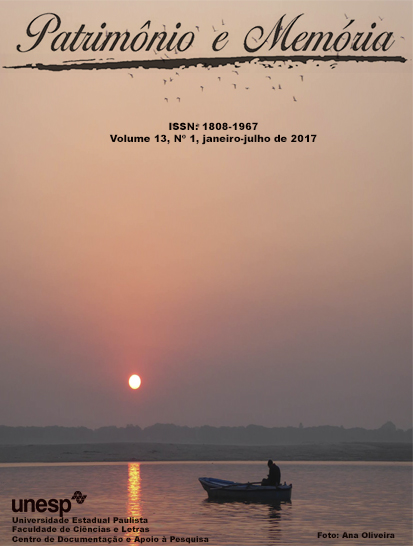O proscrito satisfeito
as obras do exílio de Victor Hugo
DOI:
https://doi.org/10.5016/pem.v13i1.3394Palavras-chave:
Victor Hugo, Exílio, Obras de exílio, Golpe de estado, Luís NapoleãoResumo
Apesar de ter apoiado a candidatura de Luís Napoleão nas eleições para presidente da República Francesa e ter ajudado a elegê-lo em 1848, Victor Hugo voltou-se contra o chefe da Nação após o golpe de Estado em dezembro de 1851. A oposição ao governo resultou num exílio que só terminou 19 anos depois, com a queda de Napoleão III. Victor Hugo produziu incansavelmente nesses anos todos: Napoléon le Petit, Les Châtiments, Les Contemplations, Les Travailleurs de la Mer, Les Chansons des Rues et des Bois, La Légende des siècles, Les Misérables, William Shakespeare, Les Travailleurs de la Mer e L’Homme qui rit são exemplos de um trabalho árduo e inspirado, que não esconde a tristeza do exílio. Este artigo pretende analisar os textos de Victor Hugo escritos durante ou após o degredo a fim de compreender de que maneira ele repercutiu em sua obra.
Referências
BROMBERT, Victor. Victor Hugo and the Visionary Novel. Londres: Harvard University Press, 1984.
CHARLES-WURTZ, Ludmila; CHARLES, David. Hugo entre Légende et Chansons, la sortie du peuple de sa minorité poétique. In: Pour une esthétique de la littérature mineure, Actes du colloque “Littérature majeure, littérature mineure” (Strasbourg, 16-18 janvier 1997), réunis et présentés par Luc Fraisse, Honoré Champion, coll. “Varia”, 2000.
HUGO, Victor. Les Chansons des Rues et des Bois. Paris: Gallimard, 1982.
______. Les Châtiments. Paris: Librairie Générale Française, 1998.
______. Les Contemplations. Paris: Garnier Flammarion, 1995.
______. Oeuvres Complètes. Correspondance. Paris: Club Français du Livre, 1967.
______. Oeuvres Complètes. Poésie II. Paris: Robert Laffont, 1985.
______. Les Misérables. Paris: Gallimard, 1967.
______. Napoléon le Petit. L’Escalier: Saint Didier, 2013.
______. Os Miseráveis. Tradução Regina Célia de Oliveira. São Paulo: Martin Claret, 2014.
______. Les Travailleurs de la Mer. Paris: Librairie Générale Française, 2002.
______. Os Trabalhadores do Mar. Tradução Machado de Assis. São Paulo: Nova Alexandria, 2002. KAHN, Jean-François. Victor Hugo, un révolutionnaire, suivi de L'Extraordinaire Métamorphose. Paris: Fayard, 2001.
PAYNE, Howard Clyde; GROSSHANS, Henry. The exiled revolutionaries and the French political police in the 1850’s. The American Historical Review, Oxford, v. 68, n. 4, p. 954-973, 1963
ROBB, Graham. Victor Hugo, uma biografia. Tradução Alda Porto. Rio de Janeiro: Record, 2000, trad. Alda Porto.
SAID, Edward. Reflexões sobre o exílio. ln: Reflexões sobre o exílio e outros ensaios. São Paulo: Companhia das Letras, 2003. p. 46-60.
STAPFER, Paul. Victor Hugo à Guernesey. Souvenirs Personnels. Société Française d’Imprimerie et de Librairie, 1905.
Downloads
Publicado
Como Citar
Edição
Seção
Licença
Copyright (c) 2017 Daniela Mantarro Callipo

Este trabalho está licenciado sob uma licença Creative Commons Attribution 4.0 International License.
Todo o conteúdo do periódico, exceto onde está identificado, está licenciado sob uma Licença Creative Commons do tipo atribuição BY.


